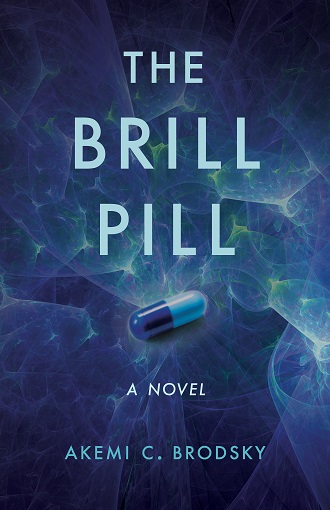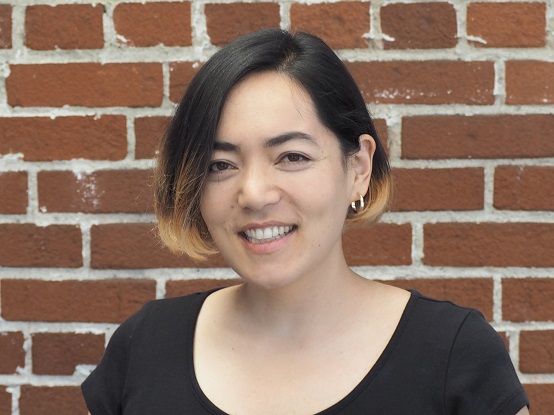The Brill Pill is loosely a science fiction story, however, to me it is more of a character study and I hope to find readers that are most interested in the human interactions that are fueled by the speculative backdrop.
Akemi C Brodsky – 15 August 2023
The Back Flap
In the not-so-distant future, organs can be re-grown from a handful of stem cells.
For patients who can afford the treatment and hang on to life support for long enough, the prognosis is good. Even the most complex organ of all can be reproduced in the lab with nearly perfect accuracy. Nearly.
Patients of brain regeneration face a wide range of problems, from loss of motor functions or intelligence to sociopathy. Spurred by personal tragedy, research scientist William Dalal works feverishly to improve the lives of those he has had a hand in saving. For every success, however, there is a consequence, and eventually a question arises in his mind: Are they worth it? His desire to help fades as he comes to realize a shocking truth: the monsters he has created are taking over.
As Will walks a fine line between altruism and ambition, acquaintances and events change the way in which he perceives the world and the extent to which he is willing to compromise in order to make his mark on it. As the situation escalates, he finds himself dealing brain-enhancing drugs and developing life-altering treatments. In their deliverance, he sees his own—but is he deluding himself?
About the book
What is the book about?
The Brill Pill is a near-future speculative story about a scientist who works with patients that have had regenerative surgery on their brains. The narrative follows the relationship of a flawed main character with these patients and explores how his emotions influence his actions and how his actions influence the wider world by virtue of his respected academic position.
When did you start writing the book?
I started writing The Brill Pill in 2015.
How long did it take you to write it?
I finished the first draft in 2017, although I took a break from working on in it in 2016, and I continued editing the manuscript, off and on, for years.
Where did you get the idea from?
A few things inspired me. My husband was doing a PhD in genetics at the time that I wrote it so I was learning a lot about what it was like working in a biology lab. I myself had worked in a geochemistry lab before and both experiences piqued my interested in research culture – academia is an insular world that few people outside of it experience so I thought it would be an interesting setting for a novel. Also, the medical library at Yale where I wrote most of the book has a ‘brain room’ in the basement where Henry Cushing’s surgical samples are displayed in jars…
Were there any parts of the book where you struggled?
Yes! I didn’t have any idea of what the ending would be when I started – at one point I couldn’t figure out what was going to happen next, but it just didn’t feel like the end of the story to me. I ended up taking a break for about six months and even starting another project before I came back to it – but when I did, it all came together in a way that I was very happy with.
What came easily?
The beginning came easily. I always find that at the beginning of writing a novel, the words flow the fastest because they really can lead anywhere, and they have the freedom to run down the page. About halfway through, when the story must inevitably begin edging toward some definition of resolution, is when it gets harder (but then that is a satisfying puzzle in itself).
Are your characters entirely fictitious or have you borrowed from real world people you know?
A little bit of both! My novel is about a scientist and I have spent a lot of time with scientists, without which I don’t think I would have been able to describe the work environment in a lab. All of the characters who work in the lab and the way they interact are certainly influenced by people I have known or worked with in the past.
We all know how important it is for writers to read. Are there any particular authors that have influenced how you write and, if so, how have they influenced you?
I often find that the author I am reading in the moment is the author that influences my writing the most so I usually make a conscious effort not to let what I’m reading get into my head too much (especially because I am reading more than one author while I write a single novel!). The Brill Pill was probably most inspired by a Vonnegut style science fiction, where science is used to explore humanity.
Do you have a target reader?
The Brill Pill is loosely a science fiction story, however, to me it is more of a character study and I hope to find readers that are most interested in the human interactions that are fueled by the speculative backdrop. The other novels that I have written (unpublished) range in genre and I hope to find readers that will appreciate my characters in any setting.
About Writing
Do you have a writing process? If so can you please describe it?
My writing process is not always consistent, but it always involves quiet and it usually involves coffee or tea. In general, I find it best to start in the morning but there are exceptions to every rule. Sometimes my mornings are quite useless and sometimes I am struck by a sudden gust of productivity in the evening. One thing I find very nearly impossible, is to write while I am hungry.
Do you outline? If so, do you do so extensively or just chapter headings and a couple of sentences?
The answer, as ever, is sometimes. For the Brill Pill, I did no outlining whatsoever. I wrote it more or less start to finish (with a break in the middle) without having any idea when I started writing what was going to happen next. I followed the characters and anticipated what they would do until the story was complete. On the other hand, I am working on a YA novel at the moment and hope to write three in the series – if only in order to keep track of everything, I have spent a considerable amount of time outlining the plot.
Do you edit as you go or wait until you’ve finished?
I wait to edit until I have finished a draft. If I begin editing before I have a full draft, I start to second guess myself and to succumb to the overwhelming doubt that I think many authors face. Once a draft is finished, I still have my doubts, but it is too late to duck out, and I am committed to working through them.
Did you hire a professional editor?
I hired a copyeditor through She Writes Press for the final manuscript but for more in depth and developmental editing, my husband has very kindly taken on the role of editor for all of my work thus far. Editing is something that cannot truly be done by yourself so I have been incredibly lucky to have a brilliant (and patient) in-house editor J.
Do you listen to music while you write? If yes, what gets the fingers tapping?
I don’t listen to music while I write. I find that I need pretty close to total silence to get much writing done these days. I used to write in cafes but I have become used to being at home and even the hustle and bustle can be distracting now (though I miss it!).
About Publishing
Did you submit your work to Agents?
Yes, I queried several agents.
What made you decide to go Indie, whether self-publishing or with an indie publisher? Was it a particular event or a gradual process?
It was a gradual process and I continued to question my decision for a while, even after I made it. I still couldn’t say 100% that it was the right thing and I am not sure it is for everyone but the more people I speak to about the publishing process, the more I feel it has been the right decision for me. Also, I am a low-key Swiftie and I like the idea of having control over my own work.
Did you get your book cover professionally done or did you do it yourself?
My cover was professionally done through She Writes Press. I gave them some ideas that had been knocking around in my head and they did a wonderful job of pulling them together into a cover I love!
Do you have a marketing plan for the book or are you just winging it?
I have hired a publicist (SparkPress) and I am trying to do what I can myself, but I am definitely learning a lot of it on the go!
Any advice that you would like to give to other newbies considering becoming Indie authors?
It is hard to give advice yet as I hardly know what I am doing, but I would say that the most important advice I was given was that you need to get used to the idea up front that everything is on you – I highly recommend asking some close family or friends to help share the load, even if it is just having someone to bounce ideas against or complain to when you need it!
About You
Where did you grow up?
The Bay Area
Where do you live now?
I split my time between the Bay Area and the UK.
What would you like readers to know about you?
I love writing but I also like to be creative in small ways every day – usually this means altering a recipe or making up a few song lyrics in my head. Sometimes it can even be as simple as finding the perfect Instagram filter. Writing is my dream job but these little things are what my day-to-day life is really about.
What are you working on now?
I am working on a young adult sci-fi series entitled The Remnant about a dystopian America that perhaps mirrors a few of the issues we face today.
End of Interview:
Get your copy of The Brill Pill from Amazon US or Amazon UK.



